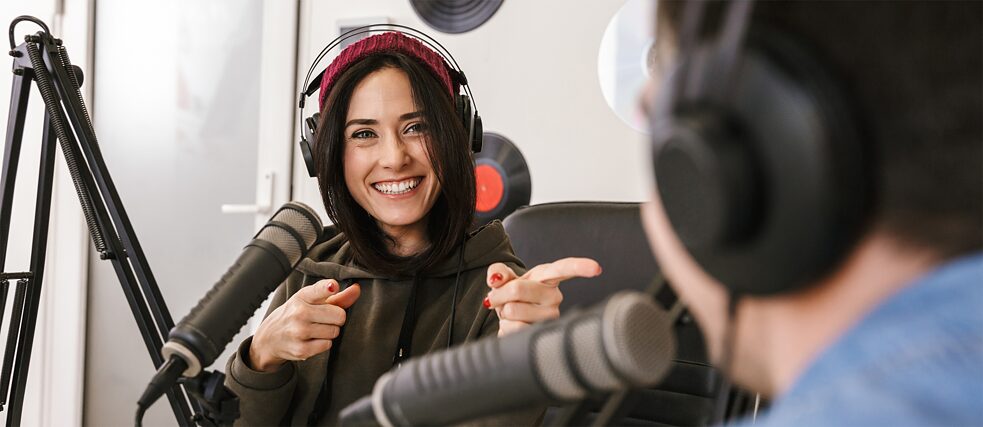Teacher Training Podcasts
Learning on the Go with Podcasts in Your Pocket

© Colourbox
Can we learn new things on the go, whilst going for a walk, exercising or doing household chores? Yes, with podcasts! They are easy-to-access serial programmes that provide knowledge about almost every niche and help us to understand complex subjects. Studies show that 61 per cent of podcast enthusiasts go for educational podcasts. We naturally form affective ties to certain podcast hosts.
“Tell me and I will forget. Show me and I may remember. Involve me and I will understand.”
Chinese proverb
The figures tell a different story: A 2023 study by the Online Audio Monitor (OAM) finds that 61% of those accessing audio content online in Germany listen to educational and informative material. Which makes this the most popular category, ahead of entertainment/comedy and news.
What is a podcast?
A podcast is a series of audio episodes that can be accessed on or downloaded from the Internet. It’s a form of “audio on demand”.
A podcast is a series of audio episodes that can be accessed on or downloaded from the Internet. It’s a form of “audio on demand”.
What podcasts have to offer
Podcasts are a very important news source for more than a third of regular listeners, and a supplementary information medium for almost half of them.Podcasts make complex subjects understandable, and can take a deep dive into specific topics and issues of interest. Most listeners end up developing affective ties to podcast hosts who manage to convey information in an entertaining way. Some “heavy listeners” actually speed the audio up to 1.5x the normal speed.
Wide range of content and formats
Public service podcasts on educational subjects and issues are often useful for teaching purposes. Many invite prominent figures to interviews or talks in order to “pick their brains” and attract a wider audience. Most educational podcasts are put together by teachers and educational influencers, who zero in on current educational issues or provide “hacks” for everyday school life. Some podcasts develop supplementary teaching material and even have their own YouTube channels.However, the range of podcasts specially designed for teachers is surprisingly much narrower. Some publishers put together podcasts to provide useful information for teaching purposes or to serve as an introduction or supplement to existing textbooks.
One of the Goethe-Institut’s educational podcasts focuses on a different approach or explanatory model in each episode to help teachers plan, execute and evaluate their courses.
Storytelling: “Tell me and I will forget”
Which story would you be more likely to remember and why?A. The king died, and then the queen died too.
B. The king died, and then the queen died of grief.
If you’re like most people, then you’re more likely to remember Story B, because A only tells us what happened, whereas B actually moves us. And our brains are hardwired to prefer stories that move us in one way or another.
We need stories to understand, remember and plan our own lives. One good example of effective storytelling, by the way, is the TV commercials shown during the breaks in the US Super Bowl, which have perfected the art of packing a story into a short ad.
As social beings, we all seek to connect with others. So, when looking for your favourite podcast, go for authenticity, personality and a voice that appeals to you. An entertaining – or even scientific/professional – style of communication is important insofar as it can enable us to form an affective bond because we like to hear people tell stories. Sitting on a train (without headphones on), have you ever noticed that from time to time you end up eavesdropping on nearby passengers’ conversations, even if you had no intention to? You just can’t help it! Well, this is the very reason for the popularity of radio programmes hosted by two presenters instead of just one.
“Show me and I may remember.”
What’s more, our brains naturally connect content to context. So if you change the setting in which you listen to each episode, you’ll create new mental connections that will be easier to recall later on. It’s also worth your while to listen to a complicated podcast more than once – or rewind to hear a complicated passage again.But where do we listen to podcasts? Podcasts are a hands-free medium par excellence, and more than half of podcast enthusiasts listen them during their commute to and from work, mostly in the car. The second largest group listen at home, usually whilst doing household chores.
Conclusion
Podcasts can’t replace certified courses of training yet, since most podcasts are produced for a specific market and make their money from paid ads.The good news is that the range of informational and educational podcasts is growing, and many of them are hosted by committed teachers providing a good introduction to a certain subject or topic. Various institutions and publishers are leading the way. We can only hope that they’ll publish more podcasts of events such as conferences and lectures in future as a way of “recycling” useful educational content.
When looking for podcasts, it’s usually a good idea to start your search by entering keywords, then check out various podcasts by different providers and create your own playlist on the subject of your choice.
“Involve me and I will understand.”
So just give it a try. Here are some podcasts about foreign language teaching, school and learning in general, ranging from “talking heads” to professionally scripted and produced podcasts. Podcasts often catch on thanks to word of mouth, so please feel free to share your recommendations with us.

Recommended podcasts
on everything from expert knowledge to good practices, put out by a range of sources from textbook publishers to independent podcast agencies to lone wolves:Impulse für Lehrende (Tips/Ideas for Teachers)
A Goethe-Institut podcast to improve training skills
This podcast takes on the complexity of teacher training: each episode focuses on a specific approach or explanatory model that provides teachers with useful background information for the planning, execution and evaluation of their courses.
Subject: Models and theories to help plan, execute and evaluate courses.Visual renderings of the models are also available
Format: Interview, two speakers
Published monthly
Target audience: Expert suggestions, tips and ideas for teachers and coaches
...........................................................
derdieDaF – Der Podcast für Lehrende (derdieDaF: The Podcast for Teachers)
A podcast by Ernst Klett Sprachen GmbH
Experts in teaching German as a foreign language address recurring as well as highly topical issues and provide practical suggestions and useful teaching “hacks”. Brief interviews/conversations with different experts in each episode.
Subject: Various aspects of teaching German as a foreign language
Format: Interview/talk
Length: Approx. 15–20 minutes
Target audience: Teachers and trainee teachers
...........................................................
Psychologie fürs Klassenzimmer (Classroom Psychology)
Dr Benedikt Wisniewski
This podcast is about educational research. In each episode, Dr Wisniewski presents a different study, review or meta-analysis for teachers to consider in their didactic/pedagogical approach.
Subject: Classroom psychology: From research to practice
Format: Scripted monologue
Length: Approx. 20 minutes
Target audience: Teachers, trainee teachers, parents
...........................................................
Auftrag:Aufbruch
Forum Bildung Digitalisierung
This podcast looks into the digital transformation of education as an undertaking that can be designed, managed and adjusted at the systemic level. Hosts Jöran Muuss-Merholz and Katja Weber (radioeins, Deutschlandfunk Nova) talk to inspiring movers and shakers who are driving transformation processes in the education system through their own work and actions.
Subject: Education/digitalization: heterogeneity, participatory justice
Format: Expert interviews/discussion
See the show notes for plenty of links and leads!
Length: 60–90 minutes
Target audience: Teachers, parents, anyone interested in equal opportunity issues
.....................................................
Kleine Pause – Begegnungen in der Teeküche –(Short Break: Encounters in the Kitchenette)
Nicole Schweiss
Two teachers and friends, Nicole Schweiss and Christina Schreck, create a space for conversation, (un)learning, listening, debating & rethinking school.
Subject: Promoting democracy, diversity and raising awareness of racism and discrimination around us. Less theoretical training, more reports on practical experiences as well as suggestions.
Format: Interview/talk, pick episodes on topics that interest you
Target audience: Teachers
...........................................................
Die Schule brennt – der Bildungspodcast (School’s On Fire: The Educational Podcast)
Some necessary reforms are long overdue in the German education system, which is going to be facing a shortage of thousands of teachers sometime soon, even as educational inequality continues to grow. Climate, war, AI and anti-Semitism also pose huge challenges to education. The host (a teacher and educational influencer) talks to experts about obstacles and possible solutions on the public service podcast.
Subject: Education policy, educational influencers
Format: Interviews/conversations with experts and well-known public figures
Pick episodes on topics that really interest you.
Length: 40–45 minutes
Target audience: Teachers and parents
...........................................................
Spektrum der Wissenschaft on detektor.fm
Spektrum der Wissenschaft is one of the most renowned science magazines in German. On this weekly podcast, the magazine’s contributors talk to detektor.fm about some of the hottest stories.
Subject: Single episode on “lifelong learning”
Format: Corresponds to a radio programme/interview format
Target audience: Science enthusiasts
Recommended reading
Rolf Dobelli: Die Kunst des klaren Denkens
Miriam Rupp: Storytelling für Unternehmen
Rolf Dobelli: Die Kunst des klaren Denkens
Miriam Rupp: Storytelling für Unternehmen